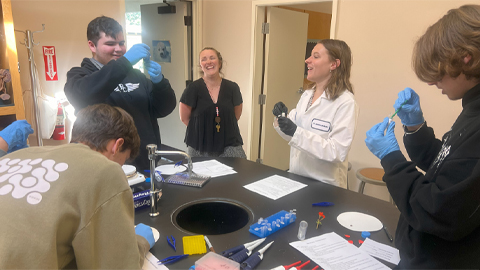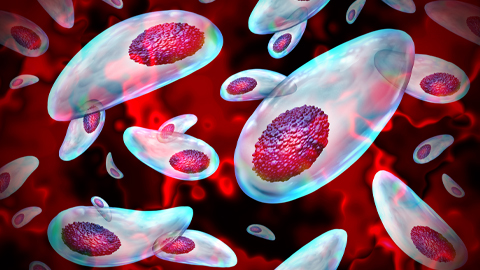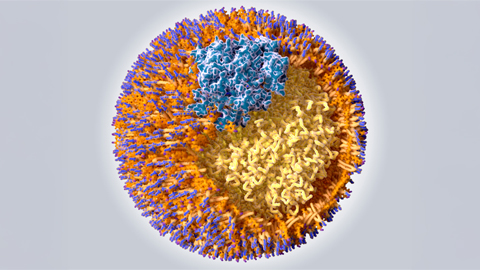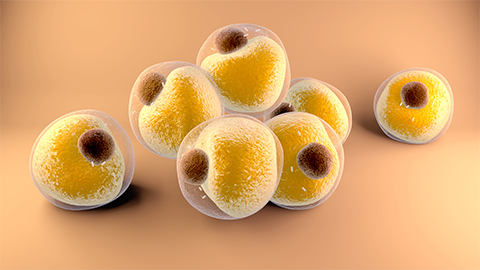ANGPTL3: A promising therapeutic direction for cardiovascular disease
Despite major advances in the treatment of cardiovascular disease, or CVD, with statins, antihypertensive and antithrombotic drugs, a residual number of patients with CVD remain untreated. These patients have a genetic disorder or extremely high levels of triglycerides (hypertriglyceridemia) that render them unresponsive to current therapies. To find new therapies, researchers are targeting circulating lipids and lipoproteins. A sedentary lifestyle and a diet high in sugar, fat and processed carbohydrates increase a person’s risk of developing CVD.

with a flavored 15% fructose solution and then treated with fish oil
supplements to demonstrate the role of diet on ANGPTL3 protein levels.
Two main sugars in the human diet are glucose and fructose. Glucose, the major component of dietary carbohydrates, is a product of starch. Fructose is found mainly in soft drinks and other beverages, desserts and candies. Although similar in calories, glucose and fructose are metabolized differently. Glucose is absorbed rapidly by almost all cells in the body, and its levels remain balanced through insulin release. Fructose is metabolized mainly by the liver, and its levels are not regulated by insulin; increased fructose consumption increases circulating triglycerides, low-density lipoprotein cholesterol, and fat around organs and blood vessels. In the process of de novo lipogenesis, fructose in the liver metabolizes to lipids.
The liver expresses and secretes angiopoietinlike 3, or ANGPTL3, which plays a role in lipid clearance; therefore, scientists see this protein as a promising therapeutic target for developing lipid-lowering drugs that target formation of triglycerides. In a recent paper in the Journal of Lipid Research, Peter Havel and colleagues wrote that consumption of dietary fructose increases circulating levels of ANGPTL3 in rhesus macaques by 30% to 40%. Increased ANGPTL3 correlated with increased levels of plasma triglycerides.
In collaboration with Arrowhead Pharmaceuticals, the authors found that inhibiting hepatic ANGPTL3 expression using RNA interference technology resulted in reduced circulating ANGPTL3 and triglycerides in rhesus macaques. Supplementing the macaques’ diet with fish oil led to decreased levels of ANGPTL3.
“These are the first studies to demonstrate the effect of diet (fructose and omega-3 fatty acids in fish oil) on ANGPTL3,” Havel said, “and suggest that ANGPTL3 is a promising target for management of hypertriglyceridemia.”
The role of dietary sugars in metabolism is a focus of Havel’s lab at the University of California, and the researchers have developed the rhesus macaque model of metabolic syndrome “in which consuming sugar-sweetened beverages accelerates the development of insulin resistance and dysregulation of lipid metabolism,” he said.
For patients with CVD who can’t benefit from current treatments, this research opens exciting possibilities for new therapies. “Suppression of ANGPTL3 production may be an important mechanism,” Havel said. “Fish oil supplements, when consumed in adequate amounts, lower plasma triglycerides and reduces CVD risk.”
Enjoy reading ASBMB Today?
Become a member to receive the print edition four times a year and the digital edition monthly.
Learn moreGet the latest from ASBMB Today
Enter your email address, and we’ll send you a weekly email with recent articles, interviews and more.
Latest in Science
Science highlights or most popular articles

Using DNA barcodes to capture local biodiversity
Undergraduate at the University of California, Santa Barbara, leads citizen science initiative to engage the public in DNA barcoding to catalog local biodiversity, fostering community involvement in science.

Targeting Toxoplasma parasites and their protein accomplices
Researchers identify that a Toxoplasma gondii enzyme drives parasite's survival. Read more about this recent study from the Journal of Lipid Research.

Scavenger protein receptor aids the transport of lipoproteins
Scientists elucidated how two major splice variants of scavenger receptors affect cellular localization in endothelial cells. Read more about this recent study from the Journal of Lipid Research.

Fat cells are a culprit in osteoporosis
Scientists reveal that lipid transfer from bone marrow adipocytes to osteoblasts impairs bone formation by downregulating osteogenic proteins and inducing ferroptosis. Read more about this recent study from the Journal of Lipid Research.

Unraveling oncogenesis: What makes cancer tick?
Learn about the ASBMB 2025 symposium on oncogenic hubs: chromatin regulatory and transcriptional complexes in cancer.

Exploring lipid metabolism: A journey through time and innovation
Recent lipid metabolism research has unveiled critical insights into lipid–protein interactions, offering potential therapeutic targets for metabolic and neurodegenerative diseases. Check out the latest in lipid science at the ASBMB annual meeting.

